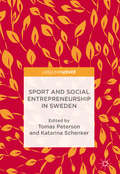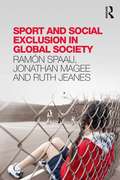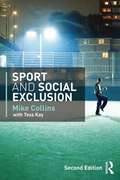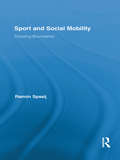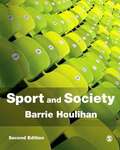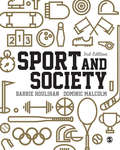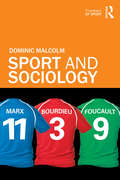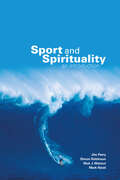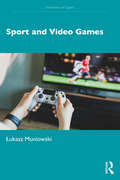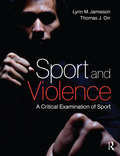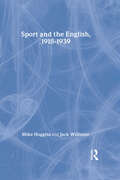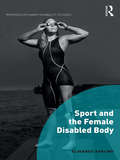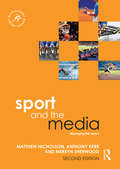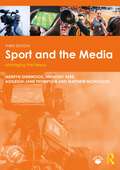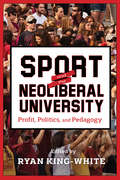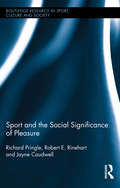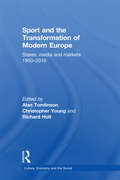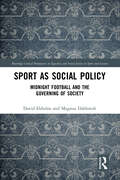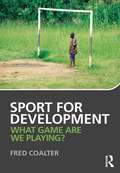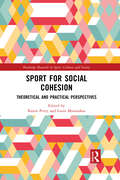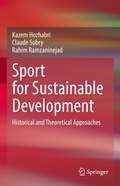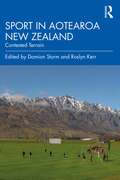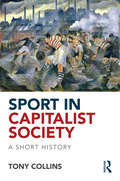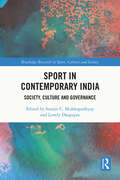- Table View
- List View
Sport and Social Entrepreneurship in Sweden
by Tomas Peterson Katarina SchenkerThis edited collection explores the concept of social entrepreneurship in sport, examining how it has been used in Swedish society to date. It explores how this approach in sport could also be used to address wider socio-political issues, including economic, political, cultural and pedagogical in European society. Sport and Social Entrepreneurship in Sweden explores different social entrepreneurship projects which have created new forms of activity and reached groups of children and young people previously disengaged in sport. The authors also highlight the growing momentum of this kind of entrepreneurship in Sweden after a period of societal upheaval that has resulted in a blurring of social borders and the founding of new organisational forms. This book contributes to the formation of a new field of research, involving theoretical and empirical work on the characteristics and possibilities of social entrepreneurship in relation to sport.
Sport and Social Exclusion in Global Society
by Ruth Jeanes Ramón Spaaij Jonathan MageeSocial exclusion is one of the most pressing challenges in post-industrial societies, encompassing economic, social, cultural and political dimensions. This important new book critically examines the relationship between sport and social exclusion, from global and cross-cultural perspectives. The book analyses sport and social exclusion by focusing on three key questions: How does social exclusion affect participation in sport? How is social exclusion (re)produced, experienced, resisted, and managed in sport? How is sport used to combat social exclusion and promote social inclusion in other life domains? To answer these questions, the authors discuss and critically reflect on existing knowledge and in-depth case studies from Europe, Australasia, Africa and Latin America. The book illuminates the relationship between sport and social exclusion in Global North and Global South contexts, addressing key issues in contemporary social science such as social inequality, worklessness, gender, disability, forced migration, homelessness and mental health. Sport and Social Exclusion in Global Society is important reading for all students, researchers and policy-makers with an interest in sport sociology, sport development, sport management, or the relationship between sport and wider society.
Sport and Social Exclusion: Second edition
by Mike CollinsTackling social exclusion should be a central aim of any civilised social policy. In this meticulously revised and updated new edition of his groundbreaking study, Sport and Social Exclusion, Mike Collins has assembled a vast array of new evidence from a range of global sources to demonstrate how the effects of social exclusion are as evident in sport as they are in any area of society. The book uses sport as an important sphere for critical reflection on existing social policy and explores sport's role as a source of initiatives for tackling exclusion. It examines key topics such as: • What is meant by 'social exclusion' • How social exclusion affects citizenship and the chance to play sport • How exclusion from sport is linked to poverty, class, age, gender, ethnicity, disability, and involvement in youth delinquency, and living in towns or countryside • How exclusion is linked to concepts of personal and communal social capital. It uses four revised and five new major case studies as detailed illustrations, notably Be Active, Birmingham, the national PE and Youth/School Sport strategy, Positive Futures and Street Games. . Sport and Social Exclusion features a wealth of original research data, including new and previously unpublished material, as well as important new studies of social exclusion policy and practice in the UK and elsewhere. This revised edition surveys all the most important changes in the policy landscape since first publication in 2002 and explores the likely impact of the London Olympic Games on sport policy in the UK. The book concludes with some typically forthright commendations and critiques from the author regarding the success of existing policies and the best way to tackle exclusion from sport and society in the future. By relating current policy to new research the book provides an essential guidebook for students, academics and policy makers working in sport policy and development."
Sport and Social Mobility: Crossing Boundaries (Routledge Research in Sport, Culture and Society)
by Ramón SpaaijCan sport serve as a vehicle for social mobility of disadvantaged social groups? How and to what extent are different forms of social capital created through sport participation? Sport and Social Mobility: Crossing Boundaries takes up these questions through a critical examination of the ways in which sport facilitates or inhibits upward social mobility. Drawing on four case studies, the book provides a rich sociological analysis of people’s lived experiences of sport in diverse social, cultural and political contexts, ranging from sport-for-development programs in Brazil and the Netherlands to rural communities and the Somali diaspora in Australia. The first international comparison of and critical reflection on the relationship between social mobility and participation in non-professional sport, this book will be essential reading for anyone interested in sport’s potential for social inclusion.
Sport and Society
by Barrie HoulihanPraise for the First Edition: `Barrie Houlihan's astonishingly ambitious and skilfully assembled collection, Sport and Society, examines the relations between sport, social policy and the social context that underlies the two. Organized around such themes as exclusion, commercialism and international comparisons, the book allows the reader to understand not only the centrality of sport to contemporary society, but the often perplexing policies that contrive to encourage or deny participation, promote or deter public sector involvement and support or undermine physical education. Importantly, Houlihan never prioritises the general over the particular, always striving to find detail amid the bigger picture' - Ellis Cashmore, Professor of Culture, Media and Sport, Staffordshire University and author of Sports Culture: An A-Z Guide 'The most comprehensive study of contemporary issues in sport by leading international scholars. Houlihan's book is the answer to sports students' prayers, full of information, statistics, tables and figures, extensive guides to further reading and, most important of all, challenging ideas. A weighty vademecum for the early 21st century' - Jim Riordan Honorary Professor of Sports Studies, University of Stirling; Professor Emeritus at University of Surrey; President of the European Sports History Association; FRSA Fully updated and revised the second edition of Barrie Houlihan's ground-breaking book provides students and lecturers with a one-stop text that is comprehensive, multi-disciplinary, accessible, international and engaging. Sport and Society allows students to: -Approach the study of sport from a multi-disciplinary perspective -Understand the importance of social structure, power and inequality in analyzing the nature and significance of sport in society -Address the rapid commercialization and regulation of sport -Engage in comparative analysis to understand problems clearly and produce sound solutions -Expand their knowledge through chapter summaries, guides to further reading and extensive bibliographies. This second edition contains five brand new chapters, which reflect recent concerns with: young athletes and human rights, sport and the city, sport and violence, sport and health and sport and Islam. A superb teaching text, the second edition will be relished by lecturers seeking an authoritative introduction to sport and society and students who want a relevant, enriching text for their learning and research needs.
Sport and Society: A Student Introduction
by Professor Barrie Houlihan Dominic Malcolm'This third edition of Sport and Society, with contributions from some of the field’s most highly respected scholars, covers the myriad of complex, pervasive and global issues confronting sport in the 21st century. It continues to be a foundation text for students across most sport disciplines' - Russel Hoye, La Trobe University, Australia ‘The third edition of Sport and Society reinforces its place as one of the most valuable texts for students and others engaging in social scientific study of sport. Overall, the book continues to achieve an unrivalled balance between different social science disciplines that have been applied to sport; between local, national and international issues; and between broad overviews and specific detail on every topic. The end result is a book that is "a must" on many academic reading lists!' - Iain Lindsey, Durham University, UK Fully updated and revised, the Third Edition of Barrie Houlihan and Dominic Malcolm's ground-breaking Sport and Society provides students and instructors with a one-stop text that is comprehensive, accessible, international, and engaging. This popular book: Approaches the study of sport from a multi-disciplinary perspective Presents the importance of social structure, power, and inequality in analysing the nature and significance of sport in society Addresses the rapid commercialization and regulation of sport Engages in comparative analysis to understand problems clearly and produce sound solutions Expands students' knowledge through chapter summaries, guides to further reading, and extensive bibliographies Offers five new chapters addressing the key contemporary issues of: lifestyle sport; sport for development and peace; the governance of international sport organisations; sports fandom; and sport in East Asia. A superb teaching text, this new edition will be relished by instructors seeking an authoritative introduction to sport and society and students who want a relevant, enriching text for their learning and research needs.
Sport and Society: A Student Introduction
by Professor Barrie Houlihan Dominic Malcolm'This third edition of Sport and Society, with contributions from some of the field's most highly respected scholars, covers the myriad of complex, pervasive and global issues confronting sport in the 21st century. It continues to be a foundation text for students across most sport disciplines' - Russel Hoye, La Trobe University, Australia 'The third edition of Sport and Society reinforces its place as one of the most valuable texts for students and others engaging in social scientific study of sport. Overall, the book continues to achieve an unrivalled balance between different social science disciplines that have been applied to sport; between local, national and international issues; and between broad overviews and specific detail on every topic. The end result is a book that is "a must" on many academic reading lists!' - Iain Lindsey, Durham University, UK Fully updated and revised, the Third Edition of Barrie Houlihan and Dominic Malcolm's ground-breaking Sport and Society provides students and instructors with a one-stop text that is comprehensive, accessible, international, and engaging. This popular book: Approaches the study of sport from a multi-disciplinary perspective Presents the importance of social structure, power, and inequality in analysing the nature and significance of sport in society Addresses the rapid commercialization and regulation of sport Engages in comparative analysis to understand problems clearly and produce sound solutions Expands students' knowledge through chapter summaries, guides to further reading, and extensive bibliographies Offers five new chapters addressing the key contemporary issues of: lifestyle sport; sport for development and peace; the governance of international sport organisations; sports fandom; and sport in East Asia. A superb teaching text, this new edition will be relished by instructors seeking an authoritative introduction to sport and society and students who want a relevant, enriching text for their learning and research needs.
Sport and Sociology (Frontiers of Sport)
by Dominic MalcolmHow has our understanding of sport been shaped by sociological ideas? How can the study of sport help sociologists to understand wider society? The sociology of sport is a sub-discipline approaching maturity. This is the first book to stand back and reflect upon the subject’s growth, to trace its developmental phases and to take stock of the current fund of knowledge. It offers a ‘state of the art’ review of the sociology of sport and investigates those areas where sport has come to influence the sociological mainstream. The book also examines how the sociology of sport has attempted to engage with a popular readership, and what the consequences of such engagement have been. Focusing on touchstone issues and concepts within sociological discourse such as race, gender, celebrity, the body and social theory, the book assesses the successes and failures of the sociology of sport in influencing the parent discipline, related sub-disciplines and the wider public. It also asks to what extent the sociology of sport can be said to be autonomous, distinctive and distinguished, and challenges students of sport to extend their work out of the narrow confines of the subdiscipline and across disciplinary divides. As the first book to provide a history of the sociology of sport and to clearly locate the contemporary discipline in the wider currents of sociological discourse, this is important reading for all students and scholars interested in the relationship between sport and society, whether they are working in sport studies or in the sociological mainstream.
Sport and Spirituality: An Introduction
by Simon Robinson Nick Watson Jim Parry Mark NestiSport science can quantify many aspects of human performance but the spiritual dimensions of sports experience cannot be fully understood through measurement. However, the spiritual experience of sport – be it described as ‘flow’, ‘transcendence’ or the discovery of meaning and value – is central both to our basic motivation to take part in sports, and to achieving success. Sport and Spirituality: An Introduction explores these human aspects of sports experience through the perspectives of sport psychology, philosophy, ethics, theology and religious studies. It includes discussions of: Spirituality in the postmodern era Spirituality, health and well-being Theistic and atheistic perspectives on sport and the spiritual Nature and transcendence – the mystical and sublime in outdoor sport Applied sport psychology and the existential Spiritual perspectives on pain, suffering and destiny Sport, the virtues, ethical development and the spirit of the game The Olympic Games and de Coubertin’s ideas of the ‘religio athletae’. This groundbreaking text will be a valuable resource for students of sport and exercise studies, sports coaching, physical education and sport and health psychology. This book should be read by all those interested in the preparation, performance and well-being of athletes.
Sport and Video Games (Frontiers of Sport)
by Łukasz MuniowskiThis book explores the complex relationships between sport and video games, two of the largest entertainment sectors globally.Focusing on those games that depict real-life sports and athletic competitions, from FIFA, Madden, and NBA 2K to Football Manager and Tony Hawk’s Pro Skater, the book examines how sport has influenced gaming, and vice versa, and how this relationship is likely to develop in the future. Arguing that sports games are a unique interface between virtual worlds and our real-life social worlds, the book examines the concept of simulation; how the performance of athletes and teams in the real world influences video games; and whether those close links enhance or limit the player’s experience. It also considers how video games are used by leagues and sports franchises, through sponsorship and in-game advertisements, to reinforce their brands. Furthermore, it presents a concise history of sports video games, and using narrative methods, it takes a close look at the importance of storytelling in sports video games, not only in the sense of the stories built into the structure of a game but also in the way that fans and media organizations build their own stories in sport, in both real and virtual worlds. The book also asks how sports video games illuminate our understanding of key social issues, including race and gender.This is fascinating reading for anybody with an interest in the sociology or culture of sport or video games, sport business, or the gaming industry.
Sport and Violence
by Lynn M Jamieson Thomas OrrSport and Violence takes a critical look at the culture of ‘sports rage’ and aggression in the sporting industry, covering ethical, historical and sociological causes and impacts. It examines international examples of sport violence, including: the father of a tennis competitor placing a drug in the drinks of her competitors; a player’s neck broken after being attacked from behind by an opponent in an NHL game; hooliganism in international soccer and more. The book not only attempts to explain how and why such violence originates, it examines its impact on society outside sport and suggests potential remedies for the problem. This book: Examines the culture of violence that permeates and surrounds sport, including the sociological causes of that violence, and what can be done to mitigate them Features an international perspective with examples of sport violence from throughout the world Offers a historical view on the evolution of violence in sport Its up-to-date and in-depth coverage of a controversial issue makes this book a valuable asset to both sports students and professionals working in sports management.
Sport and the English, 1918-1939: Between the Wars (Modern Grammar Workbooks Ser.)
by Jack Williams Mike HugginsA thorough, innovative yet entertaining and readable analysis of sport as an expression of the values and social relations of a nation. Covering the years between the two World Wars, the central place of sport in English life is brought into sharp focus, providing insight into issues of gender, class, religion and locality, ideas of morality, continuity and change, and what it meant to be English during this pivotal time. Themes include: the nature of sport and its place in national life how sport was portrayed in the media and through the sports stars of the age tradition and change in sport and in society gaining meaning from sport: the pursuit of pleasure, a moral code, and ideas of Englishness class, social conflict and social cohesion. This original and lucid study is ideal for students of sport and social history, and anyone with an interest in the social role of sport.
Sport and the Female Disabled Body (Interdisciplinary Disability Studies)
by Elisabet ApelmoThis path-breaking book analyses the experiences of young sporting women with physical impairments. Taking phenomenology as a point of departure, Elisabet Apelmo explores how the young women handle living with a body which, on the one hand, is viewed as deviant – the disabled body – and on the other hand is viewed as accomplished – the sporting body. A polarization is apparent between the weak, which is manifested through the expression of belonging as "we", and the strong individual. The subject position as strong, positive and capable – as a reaction towards the weak, the negative – is one of the few positions that are available to them. Furthermore, the book demonstrates the strategies of resistance the young women develop against the marginalisation, stereotyping and othering they experience in their everyday lives. Finally, the author discusses the paradox of gender. Disabled bodies are often seen as non-gendered, however, these young women’s experiences are structured by both the gender regimes within sports and the larger gender order of the society.
Sport and the Media: Managing the Nexus (Sport Management Series)
by Matthew Nicholson Anthony Kerr Merryn SherwoodSuccessful media relations and a sound communication strategy are essential for all sport organizations. Any successful manager working in sport must have a clear understanding of how the media works, as well as the practical skills to manage the communication process. Now in a fully revised and updated second edition, Sport and the Media: Managing the Nexus is still the only textbook to combine in-depth analysis of the rapidly developing sport media industry with a clear and straightforward guide to practical sport media management skills. The book explains the commercial relationships that exist between key media and sport organisations and how to apply a range of tools and strategies to promote the achievements of sport organisations. This updated edition includes a wider range of international examples and cases, as well as four completely new chapters covering new and social media, managing the media at major sports events, the work of the sports journalist, and the role of the sport media manager. The book's online resources have also been updated, with new lecture slides and teaching notes providing a complete package for instructors. Sport and the Media is an essential textbook for any degree level course on sport and the media, sport media management or sport communication, and invaluable reading for any sport media or sport management practitioner looking to improve their professional skills.
Sport and the Media: Managing the Nexus (Sport Management Series)
by Matthew Nicholson Anthony Kerr Merryn Sherwood Ashleigh-Jane ThompsonNow in a fully revised and updated third edition, Sport and the Media: Managing the Nexus combines in-depth analysis of the rapidly developing sport media industry with a clear and straightforward guide to practical sport media management skills. The book explains how the media works, as well as the practical skills necessary to manage the communication process. It explores the commercial relationships that exist between media and sport organisations, as well as the shift towards in-house media production, and explains how to apply a range of tools and strategies to promote the message, brand and achievements of sport organisations. This updated edition includes three completely new chapters introducing the fundamentals of storytelling, the growing significance of social issues, and the diversity of job roles and careers in sport media. It also features expanded coverage of digital technologies and social media, as well as profiles of industry professionals. This is an essential textbook for any degree level course on sport and the media, sport media management or sport communication, and invaluable reading for any sport media or sport management practitioner looking to improve their professional skills. Additional resources include case diagnostics, tutorial plans, test bank, additional readings, and links to useful websites and videos.
Sport and the Neoliberal University: Profit, Politics, and Pedagogy
by Susan Searls Giroux Joshua I. Newman Michael D. Giardina Ryan King-White Henry Giroux Neal C. Ternes Jaime DeLuca Callie Batts Maddox Matthew G. Hawzen Lauren C. Anderson Ellen J. Staurowsky Richard M. Southall Crystal Southall Oliver Rick Adam Beissel Jacob J. Bustad Ronald L. MowerCollege students are now regarded as consumers, not students, and nowhere is the growth and exploitation of the university more obvious than in the realm of college sports, where the evidence is in the stadiums built with corporate money, and the crowded sporting events sponsored by large conglomerates. The contributors to Sport and the Neoliberal University examine how intercollegiate athletics became a contested terrain of public/private interests. They look at college sports from economic, social, legal, and cultural perspectives to cut through popular mythologies regarding intercollegiate athletics and to advocate for increased clarity about what is going on at a variety of campuses with regard to athletics. Focusing on current issues, including the NCAA, Title IX, recruitment of high school athletes, and the Penn State scandal, among others, Sport and the Neoliberal University shows the different ways institutions, individuals, and corporations are interacting with university athletics in ways that are profoundly shaped by neoliberal ideologies.
Sport and the Social Significance of Pleasure (Routledge Research in Sport, Culture and Society #42)
by Jayne Caudwell Robert E. Rinehart Richard PringleThis innovative text's critical examination foregrounds the prime reason why so many people participate in or watch sport – pleasure. Although there has been a "turn" to emotions and affect within academia over the last two decades, it has been somewhat remiss that pleasure, as an integral aspect of human life, has not received greater attention from sociologists of sport, exercise and physical education. This book addresses this issue via an unabashed examination of sport and the moving body via a "pleasure lens." It provides new insights about the production of various identities, power relations and social issues, and the dialectical links between the socio-cultural and the body. Taking a wide-sweeping view of pleasure - dignified and debauched, distinguished and mundane – it examines topics as diverse as aging, health, fandom, running, extreme sports, biopolitics, consumerism, feminism, sex and sexuality. In drawing from diverse theoretical approaches and original empirical research, the text reveals the social and political significance of pleasure and provides a more rounded, dynamic and sensual account of sport.
Sport and the Transformation of Modern Europe: States, media and markets 1950-2010 (CRESC)
by Christopher Young Alan Tomlinson Richard HoltIn the modern era, sport has been an important agent, and symptom, of the political, cultural and commercial pressures for convergence and globalization. In this fascinating, inter-disciplinary study, leading international scholars explore the making of modern sport in Europe, illuminating sport and its cultural and economic impacts in the context of the supra-state formations and global markets that have re-shaped national and trans-national cultures in the later twentieth century. The book focuses on the emergence and expansion of media markets, high-performance sport’s transformation by, and effects upon, Cold War dynamics and relations, and the implications of the Treaty of Rome for an emerging European identity in sport as in other areas (for example, the influence of soccer’s governing body in Europe, UEFA, and its club and international competitions). It traces the connections between the forces of ideological division, economic growth, leisure consumption, European integration and the development of European sport, and examines the role of sport in the changing relationship between Europe and the US. Illuminating a key moment in global cultural history, this book is important reading for any student or scholar working in international studies, modern history or sport.
Sport as Social Policy: Midnight Football and the Governing of Society (Routledge Critical Perspectives on Equality and Social Justice in Sport and Leisure)
by Magnus Dahlstedt David EkholmThis book analyses the increasing use of sport in European and Western welfare states as a tool of social policy and its promotion as a solution to social problems. Midnight Football is a sports-based intervention targeting social inclusion and crime prevention in young people aged 12–25 in Sweden. This book takes a close look at its organization, pedagogy and potential outcomes. Drawing on cutting-edge research into Midnight Football in Sweden, and exploring other community sport programmes including Midnight Basketball in the United States, this book shines new light on broader social transformations regarding urban segregation and social exclusion, social policy and the governing of welfare and social policy. This book also offers new perspectives on how sport and the lives of young people intersect with and shape broader shifts in welfare and social policy in Western states, shifts that are manifested in increased inequality, social polarization and profound changes in urban geographies. This is fascinating reading for anybody with an interest in the relationships between sport and wider society, or in sport development, sport policy, social policy, public policy or youth and social work.
Sport for Development: What game are we playing?
by Fred CoalterSport is increasingly regarded as a powerful tool in international development. In this comprehensive introduction to the area of ‘sport-for-development’, leading researcher Fred Coalter critically evaluates the strengths and weaknesses and successes and failures of sport-for-development policies and programs. Beginning with an outline of the historical development of policies of sport-for-development, this book explores the objectives that remain central to international sport-for-development initiatives, including issues of defining and measuring impacts, the development of self-efficacy and leadership skills, female empowerment, HIV/AIDS awareness and social capital. Drawing on a wealth of fieldwork experience and empirical data from the most extensive monitoring and evaluation project ever undertaken with sport-for-development organisations, this is an unparalleled and fully integrated assessment of theory, policy and practice in international sport-for-development. Sport-for-development: What game are we playing is essential reading for any student or practitioner with an interest in sport-for-development, sports policy or international development.
Sport for Social Cohesion: Theoretical and Practical Perspectives (Routledge Research in Sport, Culture and Society)
by Karen PetryThis book takes a critical look at the role that sport can play in fostering social cohesion. It presents important conceptual and empirical material that sheds new light on what works, and what doesn’t, in terms of the use of sport as a tool of social policy. The book presents original research from a major international project, the Sport for Social Cohesion Lab (SSCL), that was designed to improve social cohesion in diverse, vulnerable urban neighborhoods and to support practitioners in delivering high-quality sport-for-social-cohesion. Examining the results from that project, the book also critically considers the varying definitions of ‘social cohesion’ and how outcomes are monitored and evaluated, as well as the needs, expectations and understanding of the participants. This is discussed in the context of research into other international sport-for-development projects focused on social cohesion, providing a full-spectrum analysis of both theory and practice in this important area of sports research. This is fascinating reading for all researchers, advanced students or practitioners with an interest in sport development, sport policy, social policy, or the relationship between sport and wider society.
Sport for Sustainable Development: Historical and Theoretical Approaches
by Claude Sobry Kazem Hozhabri Rahim RamzaninejadThis book looks at the potential of sport to contribute to wide-ranging development outcomes, which have been recognized across international policy declarations, most significantly in the 2030 UN Agenda for Sustainable Development. It provides a theoretical approach to sport and development. It begins by addressing the basic concepts of sport development and sustainability and then discusses the potential contribution of sport to five prioritized SDGs (SDGs 3, 4, 5, 8 and 16) and the environment as one of the sustainable development pillars that may contribute to SDGs 6, 7, 11, 12, 13, 14 and 15. This academic resource provides a macro view to students and researchers of sports sciences to know more about the fundamental concepts of sustainable development goals, and to enhance their knowledge about sport as a conduit that can help achieve wider development outcomes rather than being an end in itself. This book is of interest to students and researchers of sports studies, from sociology to management, and researchers and policy makers interested in sport and sustainable development.
Sport in Aotearoa New Zealand: Contested Terrain
by Damion SturmThis fascinating book investigates the sporting traditions, successes, systems, "terrains" and contemporary issues that underpin sport in New Zealand, also known by its Māori name of Aotearoa. The book unpacks some of the "cliches" around the place, prominence and impact of sport and recreation in Aotearoa New Zealand in order to better understand the country’s sporting history, cultures, institutions and systems, as well as the relationship between sport and different sections of society in the country. Exploring traditional sports such as rugby and cricket, indigenous Māori sport, outdoor recreation and contemporary lifestyle and adventure sports such as marching and parkour, the book examines the contested and conflicting societal, geographical and managerial issues facing contemporary Aotearoa New Zealand sport. Essential reading for anybody with a particular interest in sport in Aotearoa New Zealand, this book is also illuminating reading for anybody working in the sociology of sport, sport development, sport management, sport history or the wider history, politics and culture of Aotearoa New Zealand or the South Pacific.
Sport in Capitalist Society: A Short History
by Tony CollinsWhy are the Olympic Games the driving force behind a clampdown on civil liberties? What makes sport an unwavering ally of nationalism and militarism? Is sport the new opiate of the masses? These and many other questions are answered in this new radical history of sport by leading historian of sport and society, Professor Tony Collins. Tracing the history of modern sport from its origins in the burgeoning capitalist economy of mid-eighteenth century England to the globalised corporate sport of today, the book argues that, far from the purity of sport being ‘corrupted’ by capitalism, modern sport is as much a product of capitalism as the factory, the stock exchange and the unemployment line. Based on original sources, the book explains how sport has been shaped and moulded by the major political and economic events of the past two centuries, such as the French Revolution, the rise of modern nationalism and imperialism, the Russian Revolution, the Cold War and the imposition of the neo-liberal agenda in the last decades of the twentieth century. It highlights the symbiotic relationship between the media and sport, from the simultaneous emergence of print capitalism and modern sport in Georgian England to the rise of Murdoch’s global satellite television empire in the twenty-first century, and for the first time it explores the alternative, revolutionary models of sport in the early twentieth century. Sport in a Capitalist Society is the first sustained attempt to explain the emergence of modern sport around the world as an integral part of the globalisation of capitalism. It is essential reading for anybody with an interest in the history or sociology of sport, or the social and cultural history of the modern world.
Sport in Contemporary India: Society, Culture and Governance (Routledge Research in Sport, Culture and Society)
by Lovely Dasgupta Surajit C. MukhopadhyayThis book examines the development and significance of sport in contemporary India, one of the fastest growing sports markets worldwide.Featuring multi-disciplinary work from leading Indian scholars in sociology, economics, politics, law and business, the book demonstrates how sports help us to better understand the sociocultural and economic forces that have shaped modern India and are shaping its global, post-colonial future. The book explores many of the key themes in contemporary sports studies, including women in sports and advertisements, doping, commercialisation, nationalism, sports in education and the growth of fantasy sports, and shows how law and society intersect in sports governance. Examining the historical roots of sport in India and, of course, featuring work on India’s greatest game – cricket – the book shines new light on the development of this South Asian superpower and on how sport both reflects and shapes wider society.This book will be fascinating reading for anybody with an interest in Indian or Asian history, culture or society, or in sport business, sport development, sports law, or the sociology and culture of sport.
